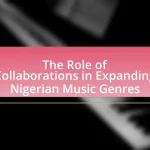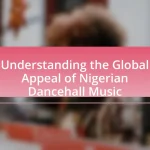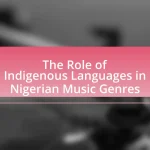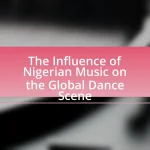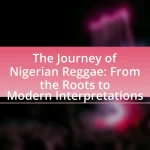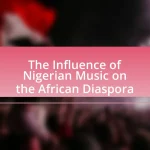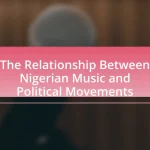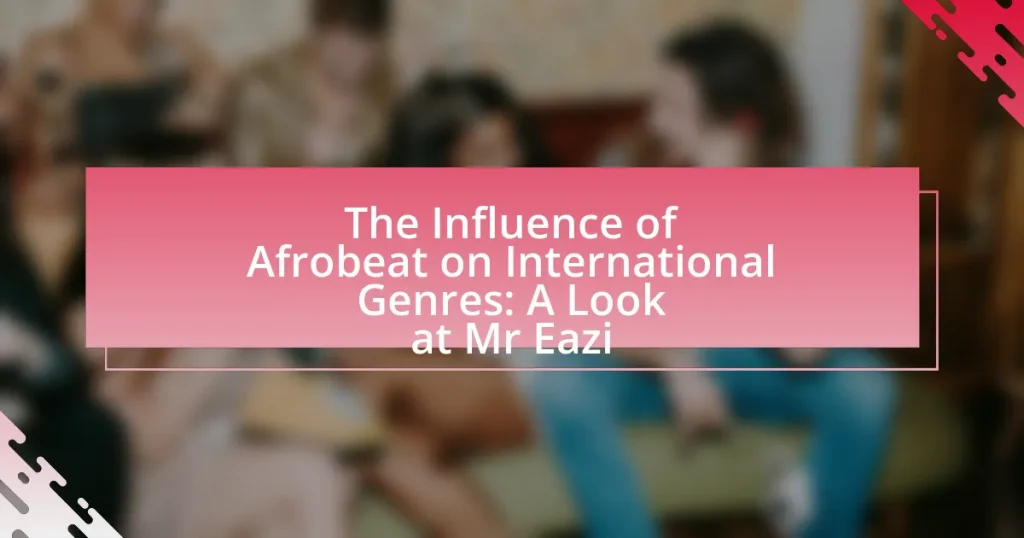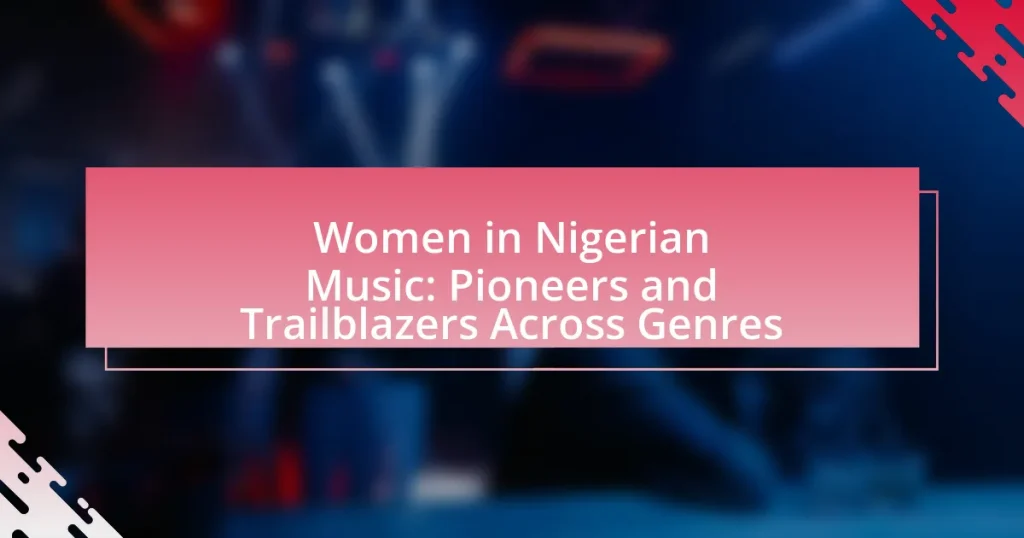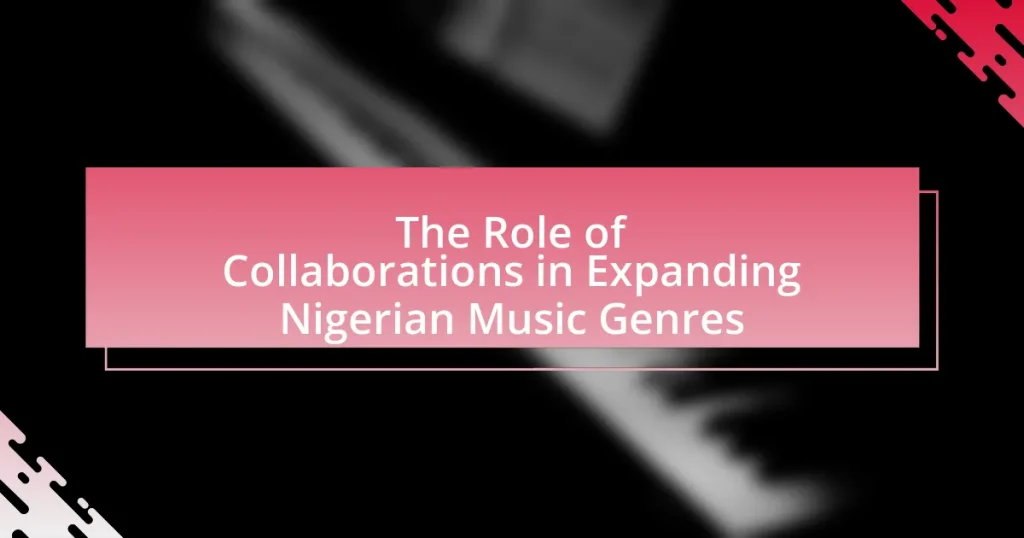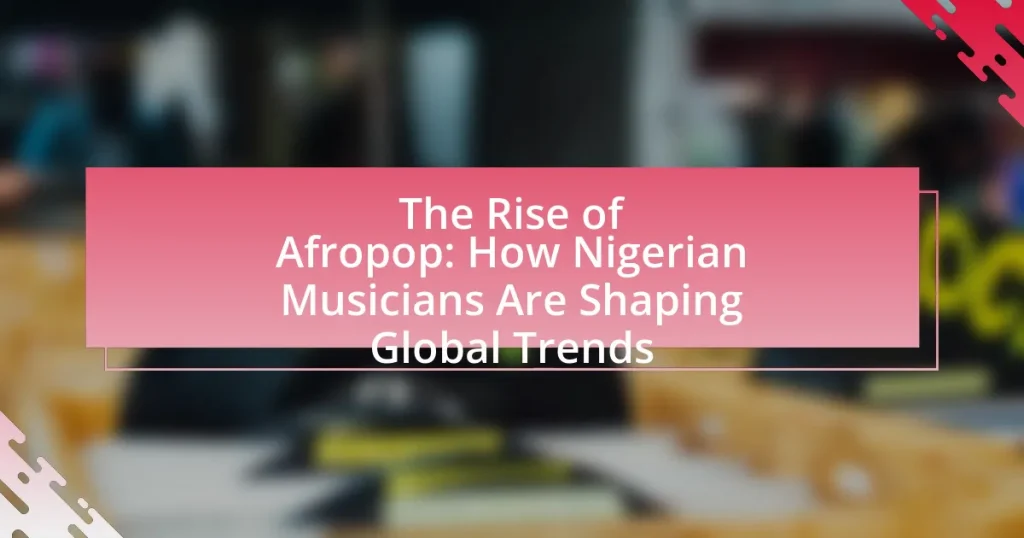Afrobeat is a music genre that originated in Nigeria in the late 1960s, characterized by its fusion of traditional West African music, jazz, highlife, and funk. Pioneered by Fela Kuti, Afrobeat has evolved to address social and political issues while influencing various international music styles, including hip-hop and electronic music. This article examines the global impact of Afrobeat, highlighting the contributions of key figures like Mr Eazi, who has played a significant role in popularizing the genre worldwide through innovative collaborations and a unique blend of sounds. The discussion includes Afrobeat’s characteristics, its influence on contemporary music trends, and the challenges artists face in maintaining cultural integrity while achieving commercial success.
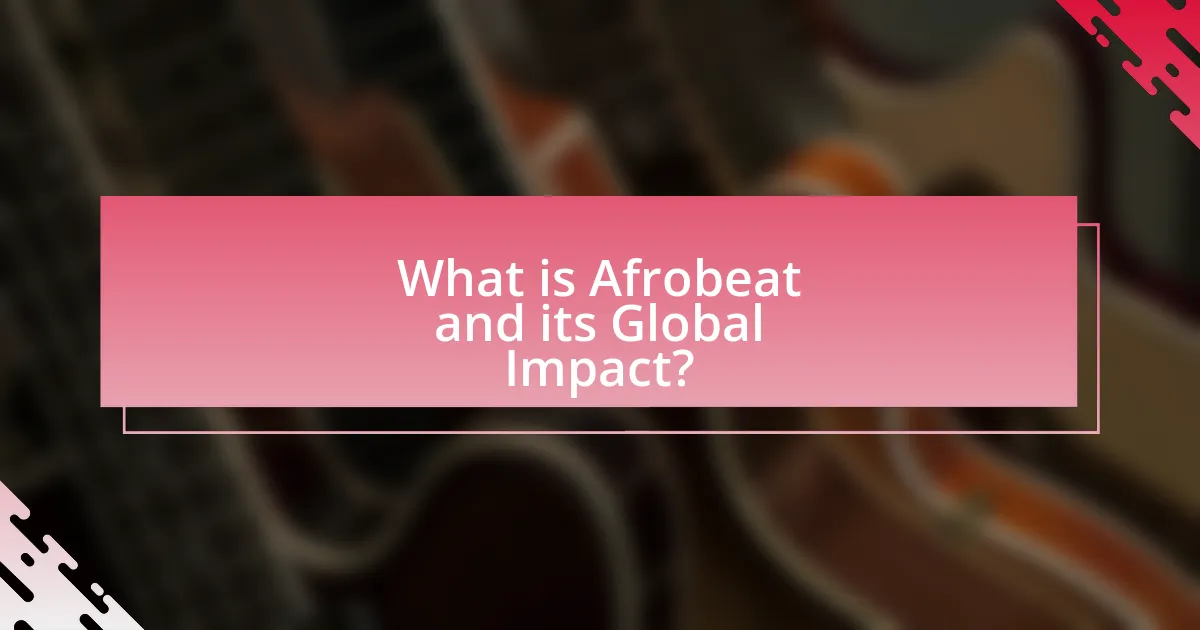
What is Afrobeat and its Global Impact?
Afrobeat is a music genre that combines traditional West African music, jazz, highlife, and funk, characterized by its rhythmic complexity and vibrant instrumentation. Originating in Nigeria in the late 1960s, Afrobeat was popularized by musicians like Fela Kuti, who used the genre to address social and political issues. Its global impact is significant, as it has influenced various international music styles, leading to collaborations with artists across genres, including hip-hop, pop, and electronic music. The genre has also contributed to the global recognition of African music, with artists like Mr Eazi bringing Afrobeat to mainstream audiences worldwide, showcasing its ability to transcend cultural boundaries and inspire new musical innovations.
How did Afrobeat originate and evolve over time?
Afrobeat originated in the late 1960s, primarily through the innovative work of Nigerian musician Fela Kuti, who fused traditional African rhythms with jazz, funk, and highlife. This genre evolved over time as it incorporated various musical influences and social themes, reflecting the political landscape of Nigeria and the African diaspora. Afrobeat’s evolution continued into the 1970s and 1980s, as artists like Tony Allen and later musicians expanded its reach, blending it with hip-hop, reggae, and electronic music, thereby influencing global music trends and inspiring contemporary artists like Mr Eazi.
What are the key characteristics of Afrobeat music?
Afrobeat music is characterized by its fusion of traditional African rhythms, jazz, funk, and highlife, creating a complex and vibrant sound. This genre typically features intricate polyrhythms, extended instrumental sections, and a strong emphasis on groove, which encourages dance. Additionally, Afrobeat often incorporates socially and politically charged lyrics, reflecting the cultural and historical context of Africa, particularly Nigeria, where it originated through the work of artists like Fela Kuti in the 1960s and 1970s. The instrumentation commonly includes brass sections, electric guitars, keyboards, and percussion, contributing to its rich, layered texture.
Who are the pioneers of Afrobeat and their contributions?
Fela Kuti is widely recognized as the pioneer of Afrobeat, having created the genre in the late 1960s by blending traditional African music with jazz, funk, and highlife. His contributions include the establishment of Afrobeat as a political and social commentary platform, using his music to address issues such as corruption and human rights abuses in Nigeria. Another significant figure is Tony Allen, who was Fela Kuti’s drummer and musical director; he played a crucial role in developing the complex rhythms that define Afrobeat. Allen’s innovative drumming techniques and compositions helped shape the sound of the genre, influencing countless musicians globally. Together, Kuti and Allen laid the foundation for Afrobeat, making it a powerful cultural movement that continues to inspire artists today.
Why is Afrobeat significant in the context of global music genres?
Afrobeat is significant in the context of global music genres because it blends traditional African rhythms with jazz, funk, and highlife, creating a unique sound that has influenced artists worldwide. This genre emerged in the 1960s and 1970s, primarily through the work of Nigerian musician Fela Kuti, who used it as a platform for political expression and social commentary. The global reach of Afrobeat has been evidenced by its incorporation into various music styles, such as hip-hop and electronic music, with artists like Mr Eazi popularizing it further through collaborations and innovative sounds. The genre’s ability to resonate across cultures and its role in shaping contemporary music trends underscore its significance in the global music landscape.
How has Afrobeat influenced other music styles worldwide?
Afrobeat has significantly influenced various music styles worldwide by integrating its rhythmic complexity, instrumentation, and cultural themes into genres such as hip-hop, R&B, and electronic music. Artists like Mr Eazi have played a pivotal role in this cross-pollination, blending Afrobeat with contemporary sounds, which has led to a rise in global collaborations and the incorporation of Afrobeat elements in mainstream music. For instance, the use of polyrhythmic beats and call-and-response vocals in tracks by international artists showcases Afrobeat’s impact, as seen in the works of Beyoncé and Drake, who have incorporated Afrobeat influences into their music. This fusion has not only expanded the reach of Afrobeat but also enriched the global music landscape, making it a vital component of modern music evolution.
What role does Afrobeat play in cultural exchange and fusion?
Afrobeat plays a significant role in cultural exchange and fusion by blending traditional African rhythms with various global music styles, thereby creating a unique sound that resonates across diverse audiences. This genre, pioneered by artists like Fela Kuti and popularized by contemporary musicians such as Mr Eazi, incorporates elements from jazz, funk, and hip-hop, facilitating cross-cultural collaborations. For instance, Mr Eazi’s work often features collaborations with artists from different genres, such as his partnership with British rapper Giggs, which exemplifies how Afrobeat fosters musical dialogue and innovation. This fusion not only enriches the global music landscape but also promotes cultural understanding and appreciation among listeners worldwide.
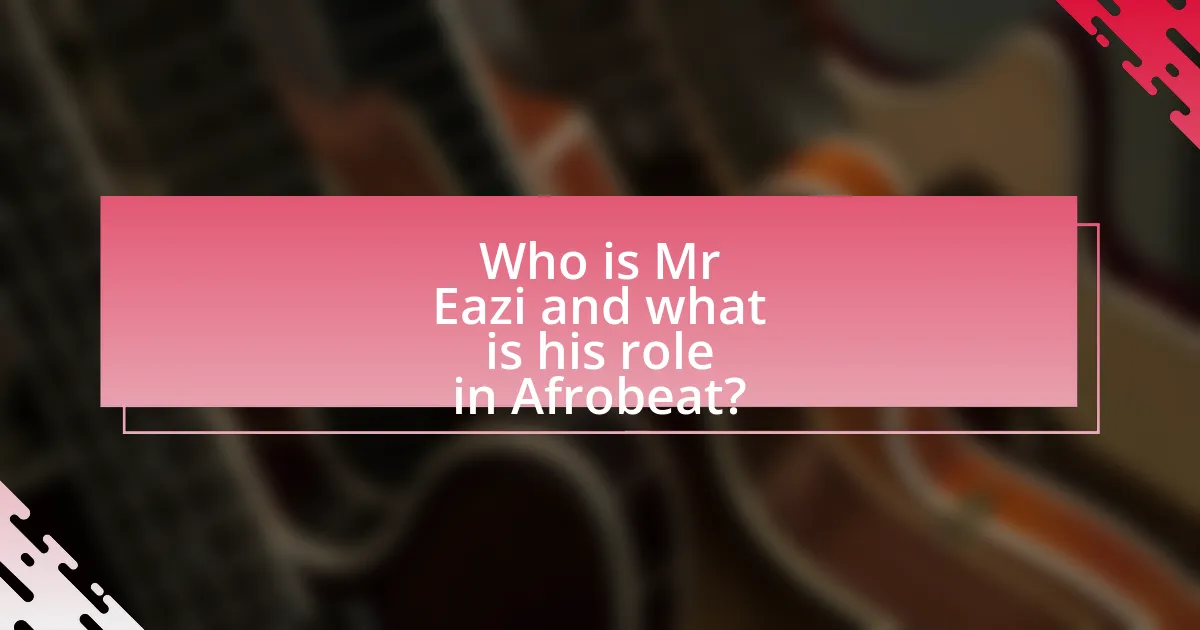
Who is Mr Eazi and what is his role in Afrobeat?
Mr Eazi is a Nigerian singer and songwriter known for his significant contributions to the Afrobeat genre. He plays a pivotal role in popularizing Afrobeat on a global scale, blending traditional African rhythms with contemporary sounds. His unique style, characterized by a fusion of Afrobeat, highlife, and R&B, has garnered international recognition, leading to collaborations with prominent artists across various genres. Mr Eazi’s music often features relatable themes and catchy melodies, which resonate with a diverse audience, further establishing Afrobeat’s influence in the global music scene.
What are Mr Eazi’s musical influences and background?
Mr Eazi’s musical influences include a blend of Afrobeat, highlife, and various genres such as hip-hop and R&B. He grew up in Nigeria, where he was exposed to diverse musical styles, particularly highlife music from the 1950s and 1960s, which significantly shaped his sound. Mr Eazi has cited artists like Fela Kuti, who is a pioneer of Afrobeat, and other contemporary Nigerian musicians as key influences in his work. His background in studying at the Kwame Nkrumah University of Science and Technology in Ghana also contributed to his musical development, as he engaged with the local music scene, further enriching his artistic expression.
How did Mr Eazi rise to prominence in the music industry?
Mr Eazi rose to prominence in the music industry through his unique blend of Afrobeat and contemporary sounds, which resonated with a global audience. He gained significant attention with his 2016 single “Skin Tight,” featuring Efya, which showcased his distinctive style and lyrical approach. His innovative use of social media platforms, particularly SoundCloud and YouTube, allowed him to reach a wider audience, leading to collaborations with international artists such as Major Lazer and J Balvin. Additionally, his establishment of the emPawa Africa initiative in 2018 further solidified his influence by supporting emerging African artists, demonstrating his commitment to the growth of Afrobeat on a global scale.
What unique elements does Mr Eazi bring to Afrobeat?
Mr Eazi brings a distinctive blend of storytelling and melodic simplicity to Afrobeat, which sets him apart from traditional artists in the genre. His use of relatable lyrics often reflects everyday experiences, making his music accessible to a broader audience. Additionally, Mr Eazi incorporates elements of highlife, a Ghanaian genre, into his Afrobeat sound, creating a fusion that resonates with both African and international listeners. This innovative approach has contributed to the global appeal of Afrobeat, as evidenced by his collaborations with international artists and chart success, such as his hit “Leg Over,” which showcases his unique style and has garnered millions of streams worldwide.
How has Mr Eazi contributed to the global reach of Afrobeat?
Mr Eazi has significantly contributed to the global reach of Afrobeat by popularizing the genre through innovative collaborations and strategic use of digital platforms. His hit singles, such as “Leg Over” and “Pour Me Water,” have garnered millions of streams worldwide, showcasing Afrobeat’s appeal beyond Africa. Additionally, Mr Eazi’s establishment of the emPawa Africa initiative has supported emerging African artists, further amplifying Afrobeat’s presence on the global stage. His collaborations with international artists like Major Lazer and J Balvin have also helped bridge cultural gaps, introducing Afrobeat to diverse audiences and solidifying its place in the global music landscape.
What collaborations has Mr Eazi engaged in with international artists?
Mr Eazi has collaborated with several international artists, including Major Lazer, J Balvin, and Diplo. His work with Major Lazer includes the track “Leg Over,” which gained significant traction globally. Additionally, he featured on J Balvin’s “Mi Gente” remix, further showcasing his influence in the international music scene. These collaborations highlight Mr Eazi’s role in bridging Afrobeat with global genres, contributing to the genre’s expansion beyond Africa.
How does Mr Eazi’s music reflect Afrobeat’s influence on global genres?
Mr Eazi’s music exemplifies Afrobeat’s influence on global genres through its fusion of traditional African rhythms with contemporary sounds, particularly in genres like hip-hop and R&B. His tracks often incorporate elements such as polyrhythmic beats, syncopated guitar riffs, and melodic hooks that are characteristic of Afrobeat, which originated from Nigeria in the 1960s. For instance, songs like “Leg Over” and “Pour Me Water” showcase these Afrobeat elements while appealing to a global audience, evidenced by their streaming success and collaborations with international artists. This blending of styles not only highlights the versatility of Afrobeat but also demonstrates its capacity to shape and enrich global music trends.
What are the broader implications of Afrobeat’s influence on international genres?
Afrobeat’s influence on international genres has led to a significant cross-pollination of musical styles, fostering global collaborations and expanding the reach of African music. This genre has introduced rhythmic complexity and rich instrumentation to pop, hip-hop, and electronic music, as evidenced by artists like Beyoncé incorporating Afrobeat elements in her work, notably in the album “The Lion King: The Gift.” Furthermore, the rise of platforms like Spotify has facilitated the global dissemination of Afrobeat, allowing artists such as Mr Eazi to collaborate with international stars, thereby enhancing cultural exchange and promoting diversity in music. The broader implications include a shift in the music industry’s focus towards African sounds, which can lead to increased representation and economic opportunities for African artists on the global stage.
How has Afrobeat shaped contemporary music trends globally?
Afrobeat has significantly shaped contemporary music trends globally by influencing various genres such as hip-hop, pop, and electronic music. The genre’s fusion of traditional African rhythms with jazz, funk, and highlife has led to a distinctive sound that resonates with diverse audiences. Artists like Mr Eazi exemplify this influence, as his music incorporates Afrobeat elements while appealing to international listeners, evidenced by collaborations with global stars and chart success in multiple countries. The rise of Afrobeat has also prompted mainstream artists to integrate its rhythms and styles into their work, further solidifying its impact on the global music landscape.
What genres have been most influenced by Afrobeat?
Afrobeat has significantly influenced genres such as hip-hop, dancehall, and electronic music. The rhythmic complexity and polyrhythmic structures of Afrobeat have been integrated into hip-hop, with artists like Kendrick Lamar and J. Cole incorporating Afrobeat elements into their tracks. Dancehall has also adopted Afrobeat’s infectious grooves, evident in the works of artists like Burna Boy and Wizkid, who blend these styles seamlessly. Additionally, electronic music producers have drawn inspiration from Afrobeat’s vibrant instrumentation and rhythms, leading to a fusion that enhances global dance music scenes.
How do international artists incorporate Afrobeat elements into their music?
International artists incorporate Afrobeat elements into their music by blending traditional Afrobeat rhythms, instrumentation, and vocal styles with various global genres such as hip-hop, pop, and electronic music. For instance, artists like Drake and Beyoncé have utilized Afrobeat-inspired beats and melodies in their tracks, showcasing the genre’s infectious grooves and syncopated rhythms. This fusion not only enhances the global appeal of their music but also reflects the growing influence of Afrobeat on contemporary soundscapes, as evidenced by the rise of collaborations with Afrobeat artists and producers, which further solidifies the genre’s presence in mainstream music.
What challenges does Afrobeat face in maintaining its authenticity while reaching global audiences?
Afrobeat faces significant challenges in maintaining its authenticity while reaching global audiences, primarily due to commercialization and cultural dilution. As Afrobeat artists gain international recognition, there is pressure to adapt their music to fit mainstream tastes, which can lead to a departure from traditional sounds and themes. For instance, Mr Eazi, a prominent Afrobeat artist, has incorporated elements from various genres, which, while expanding his audience, risks overshadowing the genre’s roots in African musical traditions. Additionally, the global music industry often prioritizes marketability over cultural integrity, leading to a homogenization of Afrobeat that may alienate its original fan base. This tension between global appeal and cultural authenticity remains a critical challenge for Afrobeat artists.
How can Afrobeat artists balance commercial success with cultural integrity?
Afrobeat artists can balance commercial success with cultural integrity by consciously integrating traditional elements into their music while appealing to broader audiences. This approach allows artists to maintain their cultural roots, as seen in Mr Eazi’s work, where he blends Afrobeat rhythms with contemporary sounds, ensuring authenticity. Research indicates that artists who prioritize cultural storytelling alongside mainstream appeal often achieve sustainable success, as they resonate with both local and global listeners. For instance, Mr Eazi’s collaborations with international artists have not only expanded his reach but also highlighted African narratives, reinforcing the importance of cultural representation in commercial spaces.
What can aspiring artists learn from Mr Eazi’s journey in the music industry?
Aspiring artists can learn the importance of innovation and cultural fusion from Mr Eazi’s journey in the music industry. Mr Eazi successfully blended Afrobeat with elements of other genres, which helped him reach a global audience and establish a unique sound. His strategic use of digital platforms for music distribution and promotion, particularly through social media, demonstrates how leveraging technology can enhance visibility and engagement. Additionally, Mr Eazi’s emphasis on collaboration with both local and international artists highlights the value of networking and building relationships within the industry. These strategies contributed to his rise, showcasing that creativity, adaptability, and collaboration are essential for success in the music landscape.
What strategies did Mr Eazi use to build his brand and audience?
Mr Eazi built his brand and audience through strategic collaborations, innovative use of social media, and a focus on the African music market. Collaborating with international artists like Major Lazer and J Balvin helped him reach wider audiences and gain credibility. His effective use of platforms like Instagram and Twitter allowed him to engage directly with fans, promoting his music and brand in a relatable manner. Additionally, Mr Eazi’s emphasis on the African sound, particularly through his “Banku Music” genre, resonated with both local and global listeners, establishing a unique identity that differentiates him in the music industry.
How can artists effectively blend genres while staying true to their roots?
Artists can effectively blend genres while staying true to their roots by incorporating elements of their original style into new musical forms. For instance, Mr Eazi successfully merges Afrobeat with various international genres like dancehall and R&B, maintaining his cultural identity through the use of traditional rhythms, instrumentation, and lyrical themes that reflect his Nigerian heritage. This approach not only honors his roots but also introduces Afrobeat to a broader audience, demonstrating that genre blending can enhance rather than dilute an artist’s original sound.

